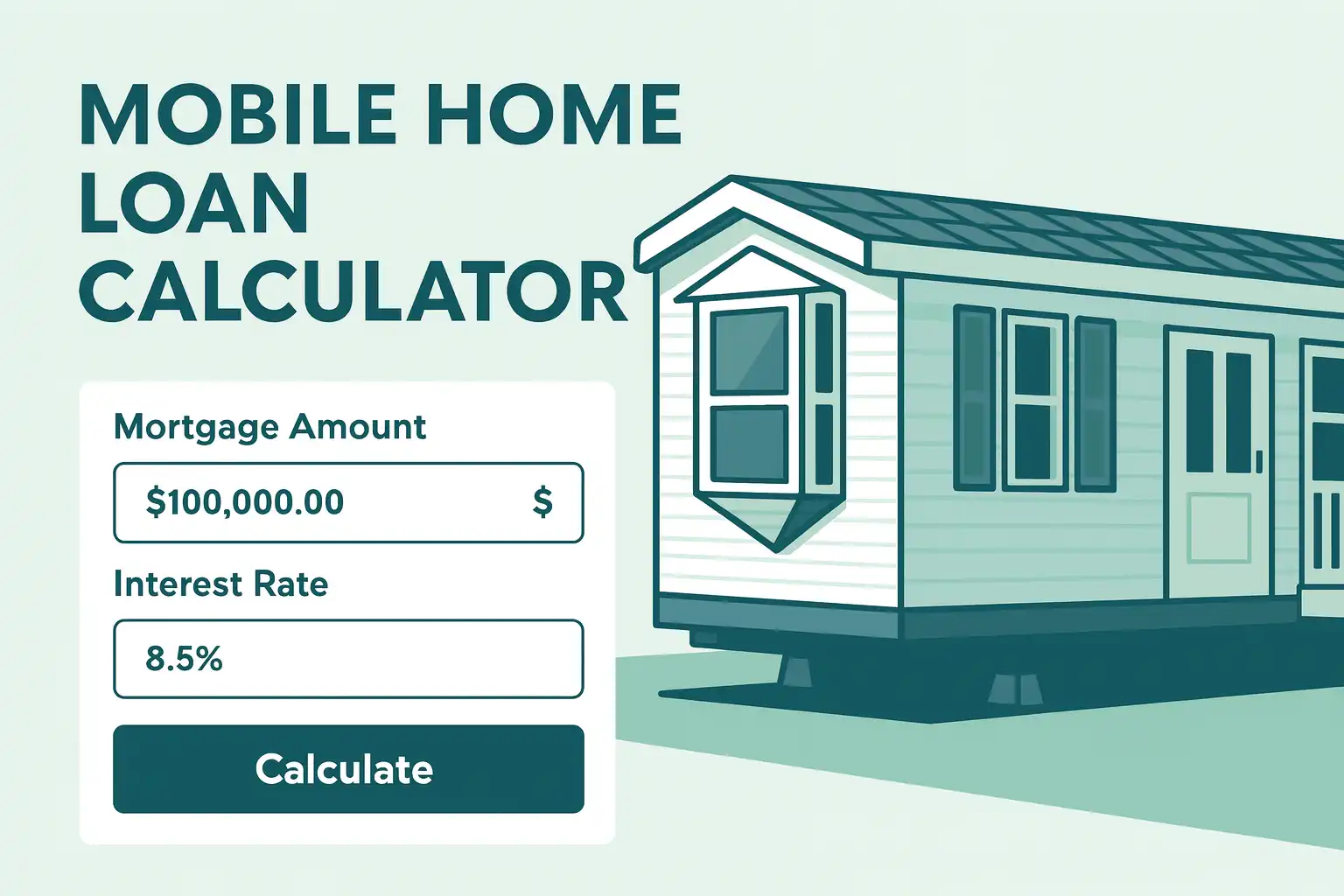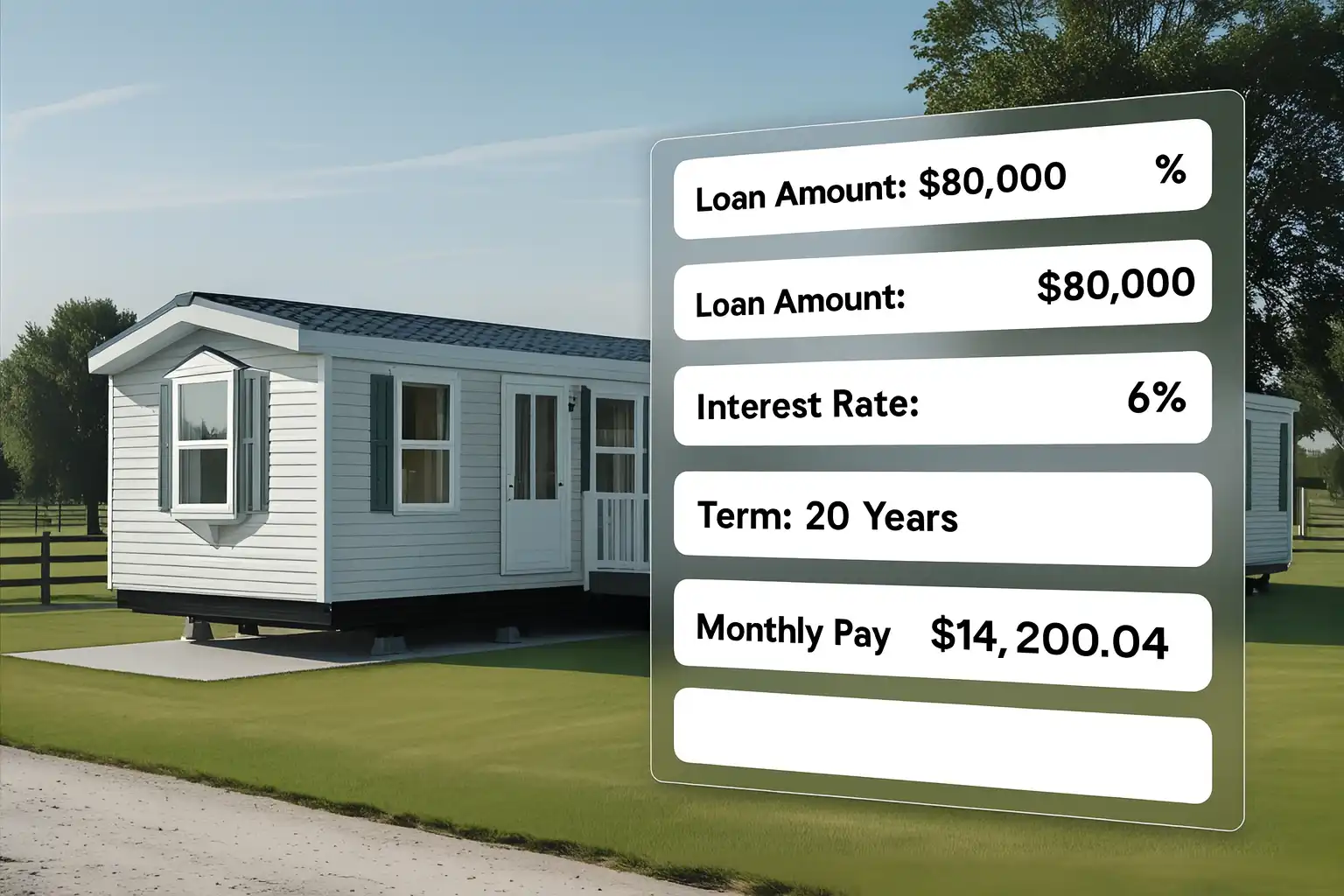Table of Contents
Looking to finance a mobile or manufactured home in the U.S.? A mobile home loan calculator is one of the smartest tools you can use before locking in your financing.
Whether you’re a first-time buyer or exploring investment opportunities, getting your numbers right is crucial. The terms of your loan, interest rate, loan amount, PMI, LTV, and more, can dramatically impact your monthly budget.
With various options like FHA, VA, USDA, and conventional loans, understanding how your choices affect your payment is key. Investors should also consider metrics like Cap Rate, DSCR, and ROI when evaluating a deal.
When I was evaluating my own mobile home purchase, I didn’t realize how annual taxes and insurance could shift my monthly costs. Learning that early would’ve helped me choose a better financing option.
Now, let’s walk through how to make smart, informed loan decisions, starting with the basics. And what all those confusing acronyms really mean.
What is a Mobile Home Loan Calculator?
A mobile home loan calculator is a digital tool that helps you estimate your monthly mortgage payment based on variables like loan amount, interest rate, loan term, and additional costs such as PMI, property tax, and homeowner’s insurance.
It’s especially helpful for buyers of manufactured or modular homes, where financing can differ from traditional mortgages. Some calculators even allow you to factor in flood insurance, HOA fees, and extra payments, giving you a more accurate picture of total costs.
By entering details like your down payment, credit score, and whether the home qualifies for an FHA, VA, or USDA loan, the calculator tailors the results to your specific scenario. That way, you’re not guessing, you’re planning.
How to Use Our Mobile Home Loan Calculator
Using our mobile home loan calculator is simple and fast. Just plug in your loan details, and it does the math instantly, no spreadsheets needed.
- Enter the Mortgage Amount: This is your total loan amount before taxes or fees. For example, if you’re borrowing $100,000, type that in.
- Set the Interest Rate: Input your expected interest rate (e.g., 8.5%). Even a small rate change can impact your monthly payment significantly.
- Choose the Mortgage Period: Use the slider to pick your loan term (e.g., 15, 20, or 30 years) or enter a custom term like 17 years. A shorter term usually means higher payments but less interest paid over time.
- Add Monthly Property Taxes & Insurance: If known, enter your estimated monthly property tax and homeowner’s insurance. These affect your total monthly cost but not the loan principal/interest.
- Review Your Monthly Payment: The calculator will show your estimated monthly payment in real time, excluding or including taxes and insurance, depending on your input.
This tool doesn’t include PMI, HOA fees, or flood insurance by default, so add those manually if needed for a complete picture.
When I was exploring a 15-year mortgage with 8.5% interest, seeing the payment breakdown helped me decide to stretch it to 20 years for more breathing room.
Key Loan Inputs Explained
To get accurate results from a mobile home loan calculator, it’s important to understand what each input means and how it affects your loan.
- Mortgage Amount: This is the total loan amount you’re borrowing, not including your down payment. For manufactured homes, this can vary based on whether you’re financing land too.
- Interest Rate (%): The interest rate determines how much you’ll pay the lender over time. Even a small increase, like 0.5%, can raise your monthly mortgage payment noticeably.
- Mortgage Period (Years): This is your loan term, typically 15, 20, 25, or 30 years. Longer terms mean lower monthly payments but more total interest paid.
- Monthly Property Taxes: Local governments charge property taxes based on your home’s value. Enter the monthly estimate to get a full cost picture.
- Monthly Property Insurance: Includes homeowner’s insurance and sometimes flood insurance if required. Protects your investment and is often required by lenders.
- PMI (Private Mortgage Insurance): If your LTV (Loan-to-Value) ratio is above 80%, most lenders charge PMI. This protects them, not you, but it adds to your monthly cost.
- HOA Fees: If your mobile home is in a park or community, include any HOA fees. These don’t affect your loan, but they do affect affordability.
Knowing these terms helps you compare FHA, VA, and USDA loan scenarios more effectively and avoid nasty payment surprises later.
How Your Mobile Home Loan Payment Is Really Calculated
When I built this mobile home loan calculator, I wanted it to feel practical, not just technical. Most tools give you a number, but don’t show how they got there. So I made sure this one lays it all out clearly, including the full math.

At its core, your monthly mortgage payment is made up of:
If your interest rate is zero, it’s a simple divide:
where n is the number of months in your loan term.
But let’s be real, most loans include interest. That’s why I included the full amortization formula used by lenders:
The Full Formula We Use
Where:
- M = Monthly payment
- P = Loan amount
- r = Monthly interest rate (your annual rate ÷ 12)
- n = Total number of payments (loan term × 12)
The calculator also supports custom loan terms. If you enter, say, 17 years, it overrides the slider, assuming it’s within the allowed range. This lets you get super specific with your planning.
Once you’ve entered your numbers, the result is cleanly rounded and shown like this: $1,047, so you know exactly what to expect before you apply.
Manufactured vs. Modular Home Loans
Not all factory-built homes are financed the same way. That’s why I created this mobile home loan calculator, and later, a second modular home mortgage calculator, to help people understand the real differences before they borrow.

Manufactured Homes: Flexible but Finicky Loans
Manufactured homes are built on a permanent steel chassis in a factory and then transported to a site. They can be placed on either a leased lot (like in a mobile home park) or a permanent foundation on privately owned land.
If the home is on your own land, you may qualify for FHA, VA, or USDA loans, just like with traditional homes. But if it’s on leased land, lenders may treat it more like personal property, requiring a chattel loan (a type of loan for movable property).
Example:
Sarah bought a manufactured home in a retirement community where the land is leased. Because she didn’t own the land, she had to use a chattel loan with a slightly higher interest rate.
Modular Homes: Better Rates, More Options
Modular homes are also factory-built, but they come in sections that are assembled on-site to meet local building codes. Once finished, they’re almost indistinguishable from traditional stick-built homes, and they qualify for the same types of financing.
Because they meet HUD or local standards, conventional loans (like a 30-year fixed-rate mortgage) are commonly available. That means better rates, lower PMI, and more flexible terms.
Example:
Jake built a modular home on his own land. Since it met all local building codes and was considered “real property,” he qualified for a conventional mortgage with just 10% down and a lower interest rate.
Here’s a quick comparison:
| Feature | Manufactured Home | Modular Home |
| Loan Type Options | FHA, VA, USDA, Chattel | FHA, VA, USDA, Conventional |
| Foundation Requirements | Permanent or Leased | Permanent Only |
| Resale Value | Often lower | Comparable to site-built homes |
| Financing Flexibility | Limited if land is not included | Broader options |
Want to estimate payments for a modular property? Try my Modular Home Mortgage Calculator to run the numbers.
Amortization Schedule and Monthly Payment Estimate
Once you enter your loan details into the mobile home loan calculator, it breaks down your payments over time using an amortization schedule. This shows how each monthly payment is split between principal and interest, month by month.
At the start of your loan term, most of your payment goes toward interest. Over time, that shifts, and more of your payment reduces the loan principal. The calculator uses this balance to create a precise schedule that helps you plan long-term.
Example Breakdown (30-Year Loan)
| Year | Monthly Payment | Principal Paid | Interest Paid | Remaining Balance |
| 1 | $1,000 | $150.00 | $850.00 | $98,200 |
| 15 | $1,000 | $520.00 | $480.00 | $64,000 |
| 30 | $1,000 | $995.00 | $5.00 | $0 |
Note: Numbers above are for illustration only.
You can also download the full amortization report as a PDF, making it easy to track how extra payments or rate changes impact your long-term cost.
When I planned out my 20-year manufactured home loan, seeing how the interest dropped year after year made me want to pay a little extra each month; it really adds up.
Why We Built This Tool:
We know buying a mobile home can feel scary. When I bought my first home, I was confused about interest, taxes, and insurance. I wish there were a simple way to see how much I would pay every month without making mistakes. That feeling inspired us to build this calculator for everyone.
Now, anyone can quickly check their loan numbers and plan their future with confidence. We wanted a tool that is easy, clear, and helps people feel calm instead of stressed when making big decisions about their home.
Final Thoughts
Buying a mobile or manufactured home comes with unique challenges, but the right tools and information make all the difference. Whether you’re financing your first home or evaluating a rental investment, using a smart, detailed mobile home loan calculator helps you plan with confidence.
We’ve covered everything from loan types and approval tips to monthly payment breakdowns and investment metrics. Now, you’re equipped to make informed choices and avoid costly surprises.
If you’re comparing options, don’t forget to try the Modular Home Mortgage Calculator as well. And if you’re ready to crunch your numbers, scroll back up and start planning your future today.
Frequently Asked Questions
Got questions? Our FAQs cover common topics about how our tools work, tips for accurate calculations, and guidance on using InterCalculator for everyday money decisions.
Why should I use a Mobile Home Loan Calculator?
A Mobile Home Loan Calculator helps you estimate monthly payments before applying for financing. It lets you compare loan options and plan your budget with more confidence.
What factors affect my mobile home loan payments?
Your loan amount, interest rate, down payment, and loan term all influence monthly payments. Even small changes in rate or term length can significantly affect affordability.
Are mobile home loan rates different from traditional mortgage rates?
Yes, mobile home loan rates are often higher than standard mortgage rates. This is because lenders consider them slightly riskier, especially if the home is not placed on owned land.
Can using the calculator help me save money?
Yes, by testing different loan amounts and terms, you can find the most cost-effective financing option. It also helps you see how paying more up front could lower long-term costs.
What types of loans can be used for mobile homes?
This calculator was created by the InterCalculator Editorial Team, led by Haris Farooq (Formula & Development). Our team specializes in formula research, calculator logic, and technical development, ensuring each tool is accurate, fast, and easy to use.
View Editorial Team →Before publishing, every calculator goes through the InterCalculator Accuracy Review Process. For the Mobile Home Loan Calculator, we verify formulas against trusted housing finance standards and loan benchmarks. We test results across multiple financing scenarios, interest rates, and repayment terms to ensure reliable outputs. All calculations are reviewed with an experienced banking and mortgage expert to confirm accuracy, clarity, and reliability.
View Process →